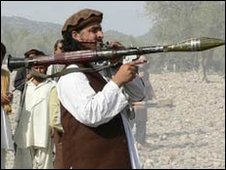|
By Gordon Corera
BBC security correspondent
|


Militants have been squeezed into an area of West Pakistan in recent years
|
The alleged Times Square bomber, Faisal Shahzad, has told investigators that he travelled to Waziristan in Pakistan for training in bomb-making. If his account is confirmed, it will be a sign that North Waziristan has become the centre of gravity for a threat which is mutating in a way that worries Western intelligence officials. Successive Pakistani military operations in neighbouring tribal regions in recent years have squeezed militant groups into the
North Waziristan
tribal agency. But as they are being pushed into one place, the various jihadist groups based in the region are increasingly working together despite their different agendas and personalities, Western officials say. Altering threat Pakistani intelligence sources describe three concentric rings of militancy, all of which now find their home in North Waziristan. The core leadership of al-Qaeda is down to less than 100 Arabs, they say.
This is surrounded by a second tier of hundreds of fighters from other countries including Kenya, Somalia, Sudan, Libya and Uzbekistan. Finally, sources estimate there are around 10,000 Pakistani militants, largely under the umbrella of the TTP or Pakistani Taliban. The Pakistani Taliban's leader Hakimullah Mehsud - whom the US thought it had killed earlier in the year - appeared in a video over the weekend claiming his group was planning to attack US cities. Analysts initially discounted this claim believing that the group lacked the capacity to carry out attacks outside of its normal area of operations in Pakistan. But they are now taking the claim more seriously, in an indication that the threat from the region is altering. Travel nexus A trickle of Westerners are still heading to these tribal areas for training, and there are also signs that jihadist groups are sending militants from Pakistan to Western countries to plan attacks.
 |
 Someone can be an al-Qaeda operative one day and a Haqqani operative the next
Someone can be an al-Qaeda operative one day and a Haqqani operative the next

Counter-terrorist official
|
In the British experience, so-called "homegrown" jihadists were able to plan serious attacks like the July 2005 bombings in London and the airline liquid bomb plot of 2006 after coming into contact with al-Qaeda and other groups in Pakistan. As a result, British counter-terrorist officials have focused closely on the travel nexus to and from Pakistan. In the last two years, the US has seen increasing signs that it is not immune from the homegrown radicalisation problem, with individuals receiving training and direction from Pakistan. Under the Obama administration the pace of drone strikes in North Waziristan has intensified and officials believe this has made it harder for the senior leadership to meet and train individuals. This may have reduced the capacity to organise complex attacks and may explain why some attacks - like that in Times Square - have not succeeded since any training has been less effective. Blurred divisions Some groups in the region focus on attacks across the Afghan border, others (like the Pakistani Taliban) on Pakistani targets, while al-Qaeda concentrates on attacking the West. Its failure to do so recently has been causing frustration, analysts say. But the divisions between groups are not always so clear-cut.

Mr Shahzad told investigators he had been trained in Waziristan
|
"Someone can be an al-Qaeda operative one day and a Haqqani operative the next," explains one counter-terrorist official, referring to the Haqqani network which has been carrying out operations over the border in Afghanistan. If the Pakistani Taliban are now planning attacks in the US or working with others to do so, it would reflect a new danger since this group is significantly larger than others - although it may be less capable. Gathering intelligence on developments within the region is a challenge and people accused of being American or Pakistani spies are regularly executed. The complex nature of jihadism in North Waziristan was illustrated recently when Khalid Khawaja, a former Pakistani intelligence officer who had been close to Osama Bin Laden, was killed by a relatively unknown group calling itself the Asian Tigers which had roots in the Punjab region and which accused him of working for the Pakistani government. One of the concerns for Western counter-terrorism officials is that the powerful Punjabi-based groups which have traditionallly focused on the Kashmir conflict may begin to co-operate with al-Qaeda and other groups with broader agendas. The US is pressing the Pakistani military to move into North Waziristan to follow up its successful campaign in surrounding areas - although there are concerns within Pakistan over stretching the military too far. Pakistani military causalities have been far in excess of those suffered by Nato forces in Afghanistan in recent years. Pakistani military officials also say they are already squeezing the North Waziristan region. But even as that squeeze tightens, the compression of jihadist groups within the area could produce a dangerous concoction.
|
© MMX
Bookmark with:
What are these?